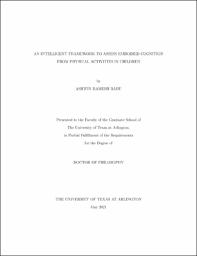
ATTENTION: The works hosted here are being migrated to a new repository that will consolidate resources, improve discoverability, and better show UTA's research impact on the global community. We will update authors as the migration progresses. Please see MavMatrix for more information.
Show simple item record
| dc.contributor.advisor | Makedon, Fillia | |
| dc.creator | Ramesh Babu, Ashwin | |
| dc.date.accessioned | 2021-06-01T20:54:04Z | |
| dc.date.available | 2021-06-01T20:54:04Z | |
| dc.date.created | 2021-05 | |
| dc.date.issued | 2021-05-11 | |
| dc.date.submitted | May 2021 | |
| dc.identifier.uri | http://hdl.handle.net/10106/29821 | |
| dc.description.abstract | Cognition refers to "The mental actions or process of acquiring knowledge and understanding through thought, experience, and the senses". It encompasses many aspects of intellectual functions and processes such as attention, working memory, response inhibition, motor functions, and more. Humans start to develop these cognitive skills right from their childhood and become fully developed through their adulthood.
Impairments in these cognitive functions, specifically in Executive Functions (Higher-order cognitive functions), disrupt their everyday life leading to a troubled childhood and lifelong difficulties in family, employment, and community functioning leading to socio-economic repercussions. Identifying such impairments at the right age (early childhood) provides the best opportunities for remedial intervention, as brain plasticity is highest in children and diminishes with age. Attention Deficiency Hyperactivity Disorder (ADHD) is one of the common psychiatric neuro-developmental disorders that often could cause cognitive impairments, specifically with executive abilities/functions. They are commonly found in children and young adolescents, starting at the age of 6, and occur three times more frequently in boys than in girls. There is a need for assessments to estimate the level of cognitive development so that proper intervention can be offered when problems with executive functions arise.
The main aim of this research is to develop an automated and non-intrusive system to measure the level of cognitive development in children (e.g., early, middle, full development) with various cognitive tasks assessing different cognitive skills. The Activate Test of Embodied Cognition (ATEC) is an assessment test designed to measure executive functions in children through physically and cognitively demanding tasks and provides measurements for attention, working memory, response inhibition, self-regulation, rhythm, and coordination as well as motor speed and balance. The proposed tool takes advantage of state-of-the-art knowledge from both the fields of Artificial Intelligence and Cognitive Sciences to provide accurate measures of cognitive development. The tool aims to assist therapists in decision-making by providing performance metrics regarding the subject's performance.
This work also advances computational methods for human action recognition to provide automatic measurements of various metrics of performance. These metrics are related to generic motion features as well as metrics explicitly defined by cognitive experts. | |
| dc.format.mimetype | application/pdf | |
| dc.language.iso | en_US | |
| dc.subject | Computer Vision | |
| dc.subject | Embodied Cognition | |
| dc.subject | Cognitive Assessment | |
| dc.subject | Human Activity Recognition | |
| dc.subject | Self-Supervised Learning | |
| dc.subject | Multi-modal fusion, Deep Learning | |
| dc.title | AN INTELLIGENT FRAMEWORK TO ASSESS EMBODIED COGNITION FROM PHYSICAL ACTIVITIES IN CHILDREN | |
| dc.type | Thesis | |
| dc.degree.department | Computer Science and Engineering | |
| dc.degree.name | Doctor of Philosophy in Computer Science | |
| dc.date.updated | 2021-06-01T20:54:05Z | |
| thesis.degree.department | Computer Science and Engineering | |
| thesis.degree.grantor | The University of Texas at Arlington | |
| thesis.degree.level | Doctoral | |
| thesis.degree.name | Doctor of Philosophy in Computer Science | |
| dc.type.material | text | |
Files in this item
- Name:
- RAMESHBABU-DISSERTATION-2021.pdf
- Size:
- 25.57Mb
- Format:
- PDF
This item appears in the following Collection(s)
Show simple item record


